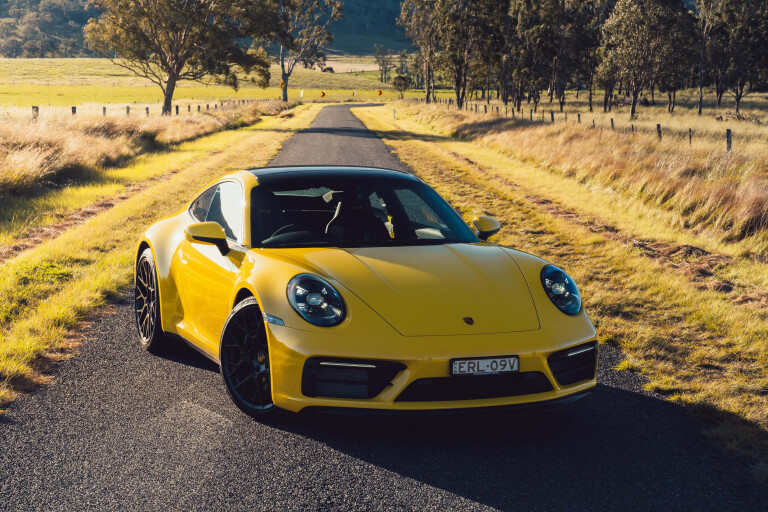
Score breakdown
Things we like
- Exceptional power delivery and noise
- Restrained but arresting looks
- Manual gearbox complements everything
Not so much
- No manual gear shift with auto selector
- Manual option restricted to coupe
If, instead of Porsche’s impressive facility in Stuttgart, the 992 911 family was actually grown on vines and finished in oak barrels, the Carrera would be a fresh young Riesling and the Carrera S would be a bold Durif, while the Turbo siblings would sit on the top shelf in grappa bottles.
But what if you want the hearty warmth of an interesting red, distilled into something that still has the trademarks of the winery but more strength and just the right amount of complexity and sweetness?
That’s where the Porsche 911 GTS comes into play. With a little extra power and sophistication without having to stretch to the eye-watering pace and price of the Turbos, the mid-range variant is the 911 equivalent of vermouth.
Until now, there was about a $110,000 gap between the Carerra 4S coupe and Turbo coupe, or narrowed to $73,000 if you jump up to the more track-focused GT3 coupe.
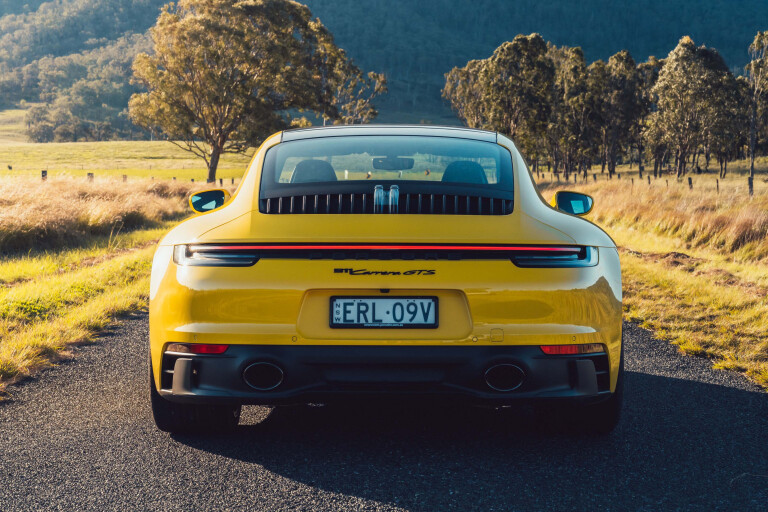
That has just changed with the Australian arrival of this GTS version of the resoundingly good 992 911. Its performance, luxuries and styling are sharpened for $314,800 – a step up of just $18,000 over the 4S coupe.
If you’re getting a sense of deja vu at about this point, so am I. That’s because I’ve already driven the new 911 GTS at its international launch in 2021, describing it at the time as “just a little faster and louder without spoiling the power delivery, it’s that little bit sharper on the road without compromising comfort, and it adds small luxury touches without becoming vulgar”.
Adding to the familiarity, I even slipped another wine analogy into the video.
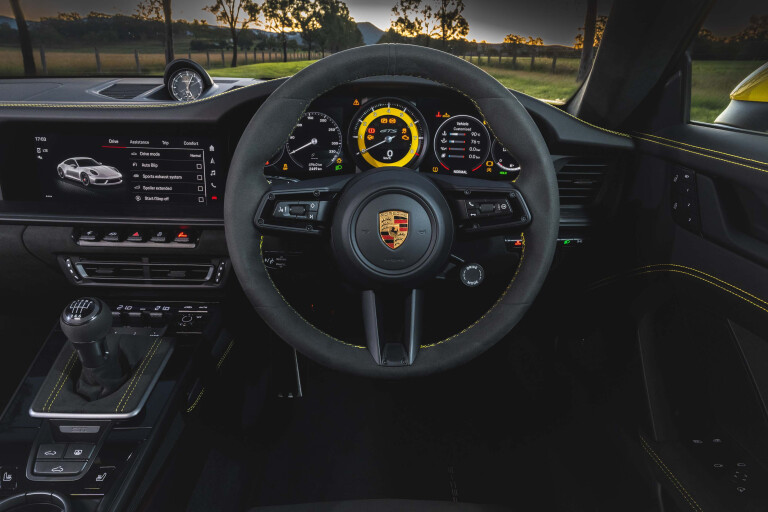
For a reunion on home turf, therefore, I was expecting none of the glowing first impressions to have changed and instead of covering the same ground a second time, let’s focus on filling in the blanks and something I didn’t manage to get my hands on in the other hemisphere – the manual.
Porsche is offering a self-serve version of the 992 GTS for the same price as the PDK and that’s significant for two key reasons. There’s now a pair of manual 911s available in the local 992 line-up, the GTS joining the GT3 (and GT3 Touring). But, while those versions get a six-speed gearbox, the GTS gets Porsche’s unique seven-speed manual.
There is a caveat. While the auto GTS is on offer as a coupe, Targa and convertible with options of two- and and-wheel drive, you can only have the manual in conjunction with the rear-drive coupe. Not a problem, it turns out.
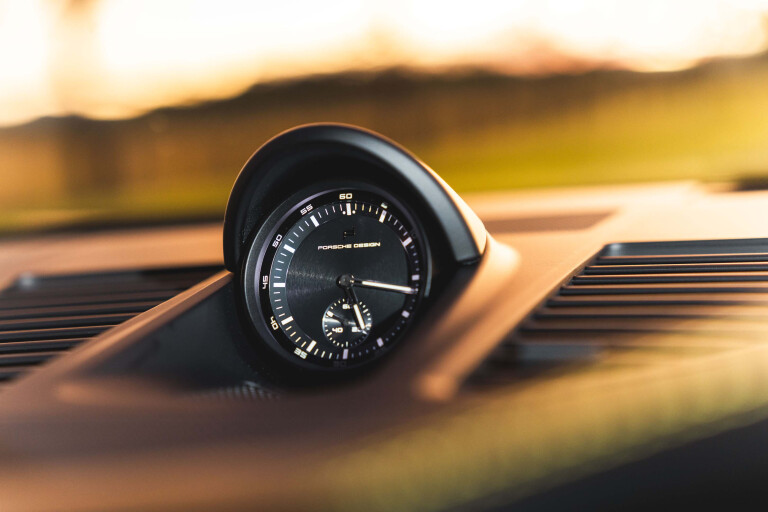
All versions get the same tuned-up version of the 3.0-litre twin-turbo flat six, which gains an extra 22kW and 20Nm for peak outputs of 353kW and 570Nm. Apply that to the all-wheel drive Carrera 4 GTS and getting to 100km/h from a standstill is possible in just 3.3 seconds says Porsche. In the manual, however, it takes 4.1s … and I’ve never cared less about eight tenths.
The level of personality, charisma and interaction that the excellent stick-shift brings to the 911 is worth it and more. Firstly, the slower shifts compared with the (also brilliant) eight-speed PDK auto create an entirely different soundtrack, with a retro vocal holler when rev-matching up and down the gears.
While the PDK promotes a more contemporary high-tech prototype racer soundtrack, the noise of the manual approaching is more akin to a 964 road-rally car. It’s utterly addictive and the shorter-throw lever makes it an absolute joy to click through the closely bunched ratios.
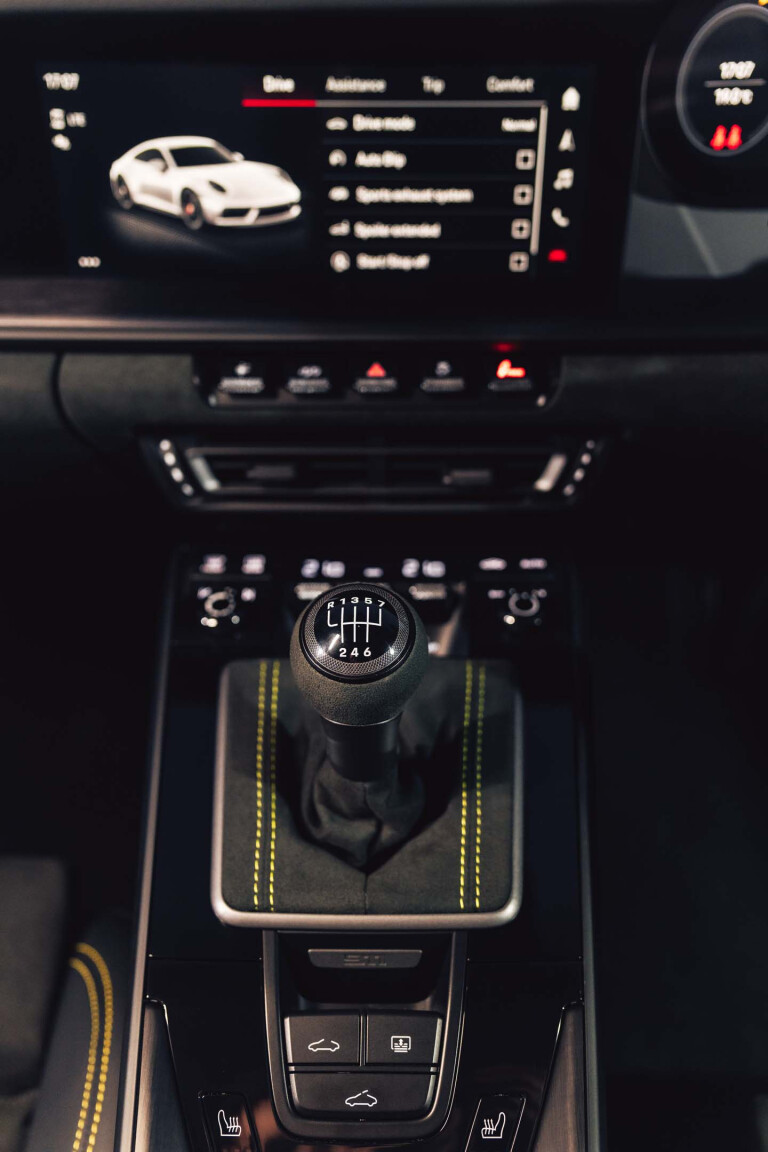
Sound inside the cabin is just as intoxicating thanks to the removal of some sound insulation for the GTS treatment. The sonorous six soundtrack permeates the interior from the special sport exhaust and induction in equal measures and does a very good rendition of a naturally aspirated engine despite its pair of turbos.
Power delivery is just as convincing and the flat-six delivers the free-revving nature and high peak power of an atmo engine with the full 353kW appearing at 6500rpm, but the temptation to push beyond to the 7500rpm redline is impossible to resist.
Generous maximum torque of 570Nm arriving at just 2300rpm and lasting all the way through to 5000rpm is the only real indication that there is some form of forced induction going on in the back stalls – that, and the amazing whistling and hissing from bypass valves and turbines – again enhanced by longer manual gear-changes.
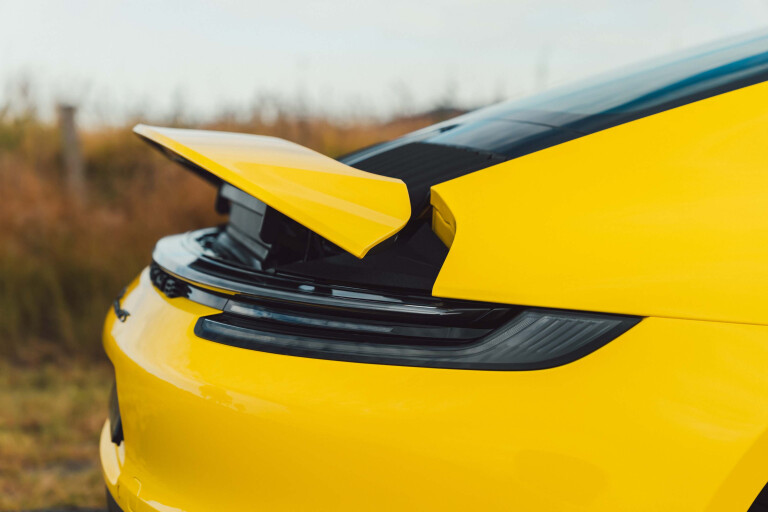
Opt for the auto in the previous 991 GTS and you had the option to manually shift using the gear selector itself in a sequential fashion, as well as using the steering wheel paddles, but the new GTS offers the paddle-only option – if you needed one more reason to go for the manual.
If you require any hard proof that manuals sound better, look no further than California, where the manual 911 GT3 has been banned for being “too loud”.
If transmissions were basketball teams, the PDK would be the Golden State Warriors – fast, efficient and popular, while Porsche’s seven-speed manual would be the Harlem Globetrotters – not the most potent or aggressive, but vastly superior in entertainment and theatrical value.
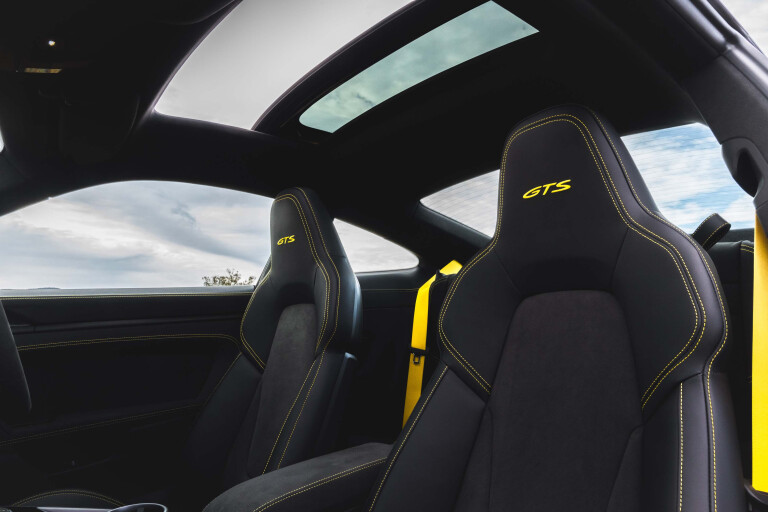
Where the analogy fails in favour of the Porsche however, is that the two NBA teams definitely don’t cost the same.
Regardless of the transmission, the 911 GTS lacks nothing in chassis charisma. How could it, with a 10mm lower ride height, retuned adaptive damper and spring rates, and wheels pinched from the Turbo S?
That, as I’ve already discovered at Porsche’s experience centre in Franciacorta, translates very nicely to a smooth, well-maintained race track with enormous cornering speeds possible and a predictable but lively tail end – particularly under hard braking.
A few more laps, and home-ground Norwell was also starting to highlight the immense and stoic stopping power of the six-piston front brakes and four-piston rears that are lifted from the Turbo, along with 21-inch wheels at the back and 20-inch rims up front.
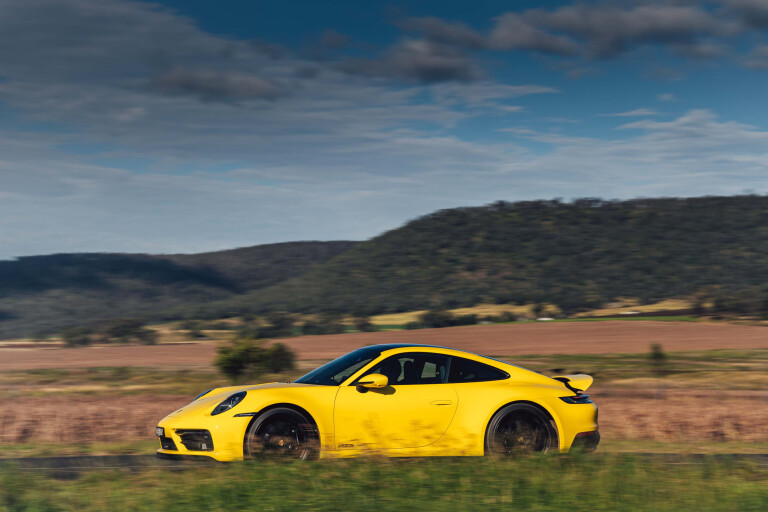
If you’ve got cash burning a really big hole in your pocket, you can upgrade to carbon-ceramic discs but the standard system is so good, it brings the necessity of the exotic material into question.
The greatest revelation 10 months later though, is just how well the bespoke GTS recipe works on local roads. With a variety of perfect, recently resurfaced asphalt and nasty storm-damaged asphalt, the deft damper tuning works an absolute treat.
Yes, the ride is stiff in all modes but completely liveable for a mid-range sports model. More surprising though, is the ability to remain unflustered by even significant imperfections in the road surface. On more than one occasion I braced for a sudden and unforeseen pothole but the GTS skimmed over with a minimum of fuss.
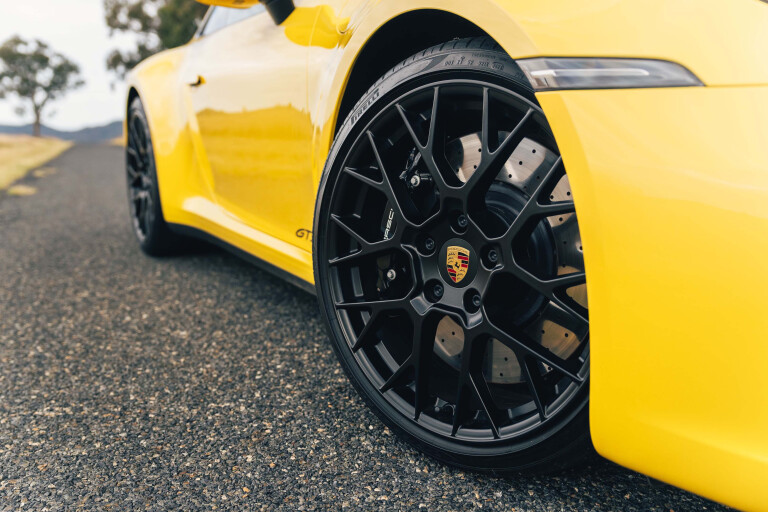
Steering also follows a similarly lovely trend. Sharpened and enhanced just enough to stand out from its more affordable siblings, there’s a delightful weight off-centre but a sensitivity and precision about the GTS that never switches off. When cruising, the slim and ergonomic steering wheel is constantly alive in the hands and full of feedback but never nagging or attention-seeking.
The combination is a car that feels focused and attentive at all times, but never exhausting or twitchy. If you plan on spending a majority of your time negotiating questionable Aussie roads in a 911, the base Carrera and S are probably still the pick with the most compliant ride while still offering a heap of fun at the wheel, but for a balance of track potential and open road useability, the GTS is, once again, king of the line-up.
Similar logic applies to the styling and equipment package. While the variants beyond the mid-point start to introduce more ostentatious aesthetics, the GTS is pleasantly restrained and the lack of louvres, spoilers and splitters highlights one of the prettiest and most elegant 911 designs in almost 60 years of evolution.
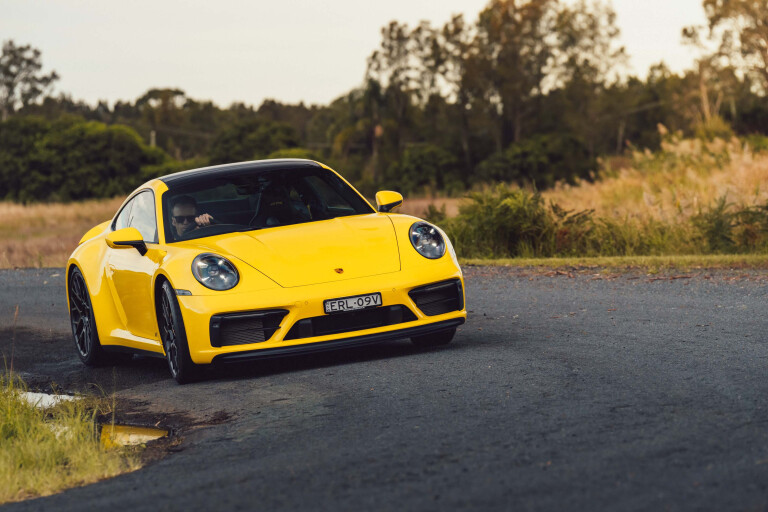
Which begs the question – carbon-fibre roof or pop-top sunroof? It’s probably the latter that makes most sense in a version of the 911 that offers the best balance of luxury and performance and if the small amount of poise that the glass panel costs bothers you, then the GT3 corner is probably the part of the showroom you might want to wander over to.
Speaking of which, the GT3 is an impossibly accomplished iteration of the 911 and deserves its almost unanimous acclaim from media and customers alike but, ironically, it’s that car which makes the best case for the GTS.
Harnessed in at the wheel of the roll-caged, finned and spoilered 911, it’s about as easy to fully relax as when taking a retired police Alsatian for a walk without a muzzle. The GTS however, is like walking a retired greyhound. Let it off the lead and it’ll occasionally eat a cavoodle, but the rest of the time it’s just fine trotting by your side or on the couch.
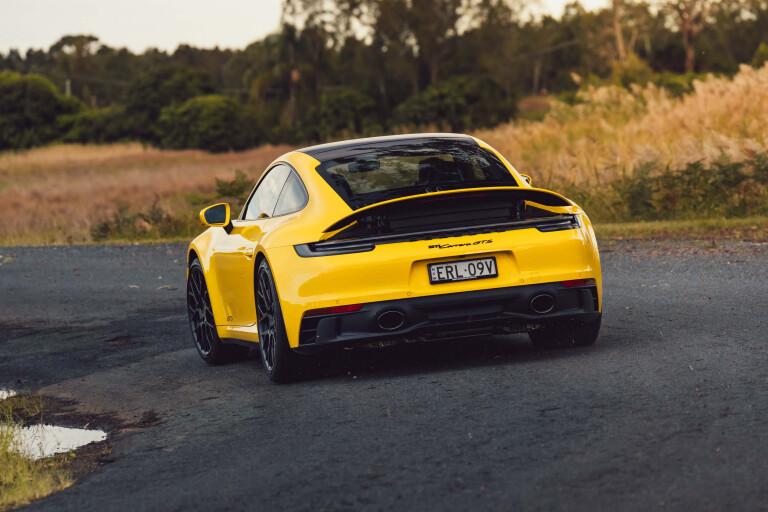
Further enhancing the best-of-both-worlds 911 is a selection of kit that, like the performance enhancements, suits a day between the Armco without compromising its on-road manners.
Porsche’s normally pricey Sport Chrono pack is included in the price, bringing the beautiful dash-mounted stopwatch, steering wheel-mounted driving mode dial, Track precision application, tyre temp monitor and the option to switch the Porsche Stability Management independently.
Like the exterior, the GTS cabin also gets a dusting of blacked-out and darker trims and finishes. Black anodized centre console, door trims and dash cappings match the satin black wheels and smoked LED exterior lights. GTS embroidery on the beautifully ergonomic Sport Plus seats reminds occupants of the more desirable heritage, as do the tread plates on entry and exit.
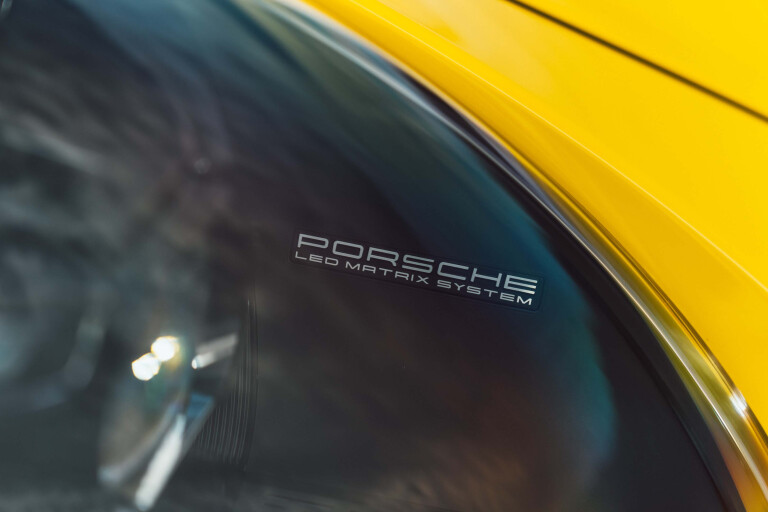
Regardless of the variant, the GTS packs in a lot more value compared with the Carrera S but, of course, Porsche offers a long list of options that enables an even more bespoke and desirable product.
The hardest decision, however, is deciding which of the five new variants one should pick. Something with the ‘4’ all-wheel-drive system will doubtless offer a little more versatility for all-season driving and the ability to open the taps earlier in corners.
But it’s the rear-drive coupe that is so wonderfully engaging and captivating without having a nasty side that becomes scary or unmanageable when poked. Discovering that lovely facet to the GTS’s character has been worth the ten-month wait since I first encountered the Carrera 4 GTS in Italy.
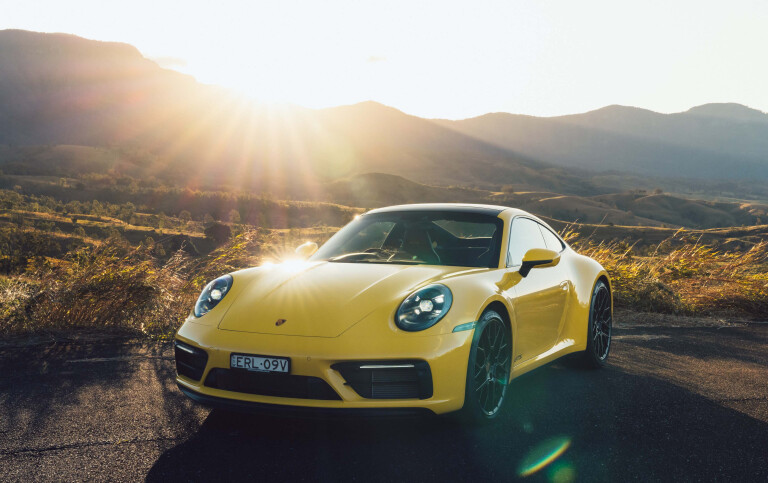
So that leaves just one remaining decision. I, like many Porsche fans, am increasingly gravitating toward the excellent and battle-proven dual-clutch auto, and applications like the excessively long-legged Cayman GTS 4.0 manual don’t stack up well in the manual vs auto argument.
To that end, I was expecting a blast in the new manual 911 GTS to galvanise my suspicion that it’s finally time to let the H-pattern dream go.
But the spectacularly good seven-speed 911 GTS is a dazzling reminder that the very best driver’s Porsches will always allow room for the traditional manual, enhancing a glorious engine and fine dynamics in equal measures, as a single harmonious and complementary union.
Long may that last.
2022 Porsche 911 GTS manual specifications
| Body: | 2-door 2+2 sports coupe |
|---|---|
| Drive: | rear-wheel |
| Engine: | 2981cc flat-6, DOHC, 24v, twin-turbo |
| Transmission: | 7-speed manual |
| Power: | 353kW @ 6500rpm |
| Torque: | 570Nm @ 2500-5000rpm |
| Bore stroke (mm): | 91.0 x 76.4mm |
| Compression ratio: | 10.2:1 |
| 0-100km/h: | 4.1 sec (claimed) |
| Fuel consumption: | 10.2L/100km (combined) |
| Weight: | 1510kg (unladen) |
| Suspension: | MacPherson struts front/multi links rear |
| L/W/H: | 4533mm/1852mm/1294mm |
| Wheelbase: | 2450mm |
| Brakes: | 408mm ventilated discs front / 380mm ventilated discs rear |
| Tyres: | 245/35 ZR 20 front/305/30 ZR 21 rear |
| Wheels: | 20-inch alloy front/21-inch rear |
| Price: | $314,800 ($371,750 as tested) + on-road costs |
Score breakdown
Things we like
- Exceptional power delivery and noise
- Restrained but arresting looks
- Manual gearbox complements everything
Not so much
- No manual gear shift with auto selector
- Manual option restricted to coupe



COMMENTS